(完整版)小学英语单复数
名词单复数小学名词单复数规则详解与练习
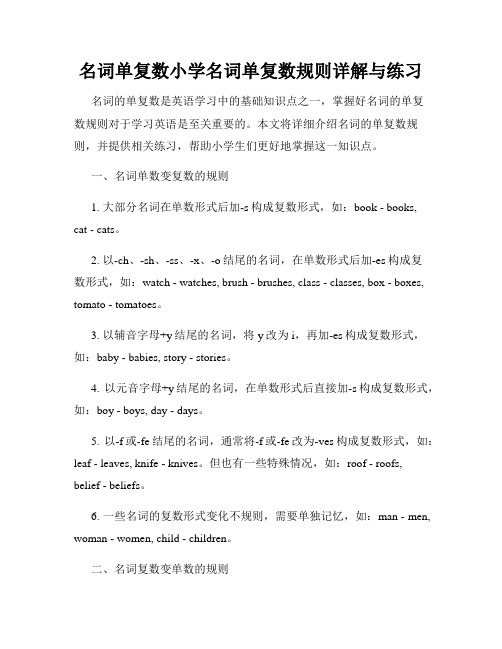
名词单复数小学名词单复数规则详解与练习名词的单复数是英语学习中的基础知识点之一,掌握好名词的单复数规则对于学习英语是至关重要的。
本文将详细介绍名词的单复数规则,并提供相关练习,帮助小学生们更好地掌握这一知识点。
一、名词单数变复数的规则1. 大部分名词在单数形式后加-s构成复数形式,如:book - books, cat - cats。
2. 以-ch、-sh、-ss、-x、-o结尾的名词,在单数形式后加-es构成复数形式,如:watch - watches, brush - brushes, class - classes, box - boxes, tomato - tomatoes。
3. 以辅音字母+y结尾的名词,将y改为i,再加-es构成复数形式,如:baby - babies, story - stories。
4. 以元音字母+y结尾的名词,在单数形式后直接加-s构成复数形式,如:boy - boys, day - days。
5. 以-f或-fe结尾的名词,通常将-f或-fe改为-ves构成复数形式,如:leaf - leaves, knife - knives。
但也有一些特殊情况,如:roof - roofs,belief - beliefs。
6. 一些名词的复数形式变化不规则,需要单独记忆,如:man - men, woman - women, child - children。
二、名词复数变单数的规则1. 大部分名词复数形式去掉s或es即可得到单数形式,如:books - book, cats - cat。
2. 一些名词的单复数形式相同,如:fish - fish, sheep - sheep, deer - deer。
三、名词单复数规则的练习练习一:将下列名词变成复数形式。
1. pen2. house3. apple4. woman5. tomato6. child7. city8. box9. leaf10. thief练习二:将下列名词变成单数形式。
(完整版)小学英语人称与数的变化
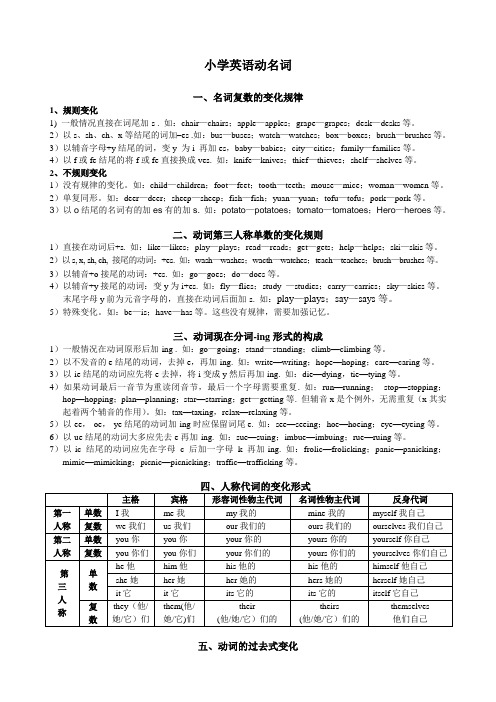
小学英语动名词一、名词复数的变化规律1、规则变化1) 一般情况直接在词尾加-s . 如:chair—chairs;apple—apples;grape—grapes;desk—desks等。
2)以s、sh、ch、x等结尾的词加–es .如:bus—buses;watch—watches;box—boxes;brush—brushes等。
3)以辅音字母+y结尾的词,变y 为i 再加es,baby—babies;city—cities;family—families等。
4)以f或fe结尾的将f或fe直接换成ves. 如:knife—knives;thief—thieves;shelf—shelves等。
2、不规则变化1)没有规律的变化。
如:child—children;foot—feet;tooth—teeth;mouse—mice;woman—women等。
2)单复同形。
如:deer—deer;sheep—sheep;fish—fish;yuan—yuan;tofu—tofu;pork—pork等。
3)以o结尾的名词有的加es有的加s. 如:potato—potatoes;tomato—tomatoes;Hero—heroes等。
二、动词第三人称单数的变化规则1)直接在动词后+s. 如:like—likes;play—plays;read—reads;get—gets;help—helps;ski—skis等。
2)以s, x, sh, ch, 接尾的动词:+es. 如:wash—washes;wacth—watches;teach—teaches;brush—brushes等。
3)以辅音+o接尾的动词:+es. 如:go—goes;do—does等。
4)以辅音+y接尾的动词:变y为i+es. 如:fly—flies;study —studies;carry—carries;sky—skies等。
末尾字母y前为元音字母的,直接在动词后面加-s. 如:play—plays;say—says等。
(完整版)小学英语名词单数变复数规则及练习
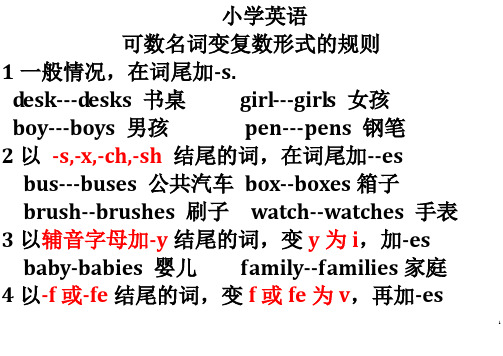
小学英语可数名词变复数形式的规则1一般情况,在词尾加-s.desk---desks 书桌girl---girls 女孩boy---boys 男孩pen---pens 钢笔2以-s,-x,-ch,-sh结尾的词,在词尾加--esbus---buses 公共汽车box--boxes箱子brush--brushes 刷子watch--watches 手表3以辅音字母加-y结尾的词,变y为i,加-es baby-babies 婴儿family--families家庭4以-f或-fe结尾的词,变f或fe为v,再加-esknife---knives刀leaf---leaves树叶5以辅音字母加-o结尾的词,有生命的,在词尾加-es;tomato---tomatoes西红柿potato--potatoes马铃薯没有生命的,在词尾加-sphoto---photos 照片6可数名词变为复数形式的不规则变化如下:foot---feet脚mouse---mice老鼠goose---geese鹅child---children孩子ox---oxen公牛m a n---m e n男人wom a n---wom e n女人Chinese--Chinese中国人deer---deer鹿fish---fish鱼sheep---sheep绵羊<一>、写出下列名词的复数形式1、orange oranges2、class classes3、text texts4、monkey monkeys5、piano pianoes5、child 7.shelf8、bed 9、country10.Family 11、toy 12、foot 13、Japanese 14、radio 15、photo 16、army 17、tomato 18、fox 19、woman 20、knife 22、sheep1)、选择填空1、There on the wall .They are very beautiful.A.are photoesB. are photosC. is a photoD. is photos2. This kind of car made in Shanghai.A. is B .are C .were D .has3. There are four and two in the group.A. Japanese, Germen B Japaneses, GermenC. Japanese,GermanD.Japanese, Germans4. That’a art book.A. anB. aC. the D are5. The boys have got already.A. two breadB. two breadsC. two pieces of breadD. two piece of bread6. The old man wants .A. six boxes of applesB. six boxes of appleC. six box of applesD. six boxs of apples7. There some in the river.A. is ,fishB. are, fishsC. is, fishsD. are ,fish8. There two in the box.A. is watchB. are watchesC. are watchD. is watches9. We should clean twice a day.A .our tooth B. our toothsC.teethD.our teeth10.The _____ meeting room is near the reading room.A.teacherB.teacher’sC.teachers’D.teachers11. In Britain _____ are all painted red.A.letter boxesB.letters boxesC.letter boxD.letters box2)选择填空1.They come from different ______A. countryB. countriesC. a countryD. countrys2.How many ______ do you see in the picture?A. tomatosB. tomatoesC. tomatoD. the tomato3. They are______.A . woman teachers B. women teachersB.women teacher D. woman teacher4. Would you like _______ ,please?A. two glass of waterB. two glasses of waterC.C. two glass of watersD.two glasses of waters5.Most of ______ live in _______.A.Germans, GermanB. German, GermenB.Germen, Germany D. Germans, Germany6.There are some ______ in these _______.A.knifes pencil-boxesB.knives pencils-boxC.knives pencil-boxD.knives pencils-boxes7. ______ like ______ by air.A. Greens, travellingB. The Green, travelingC. The Greens, travelD. The Greens, traveling8.I wonder why ______ are interested in action films (武打片).A.the peopleB. peopleB.peoples D. the peoples9.There is no ______ in the plate.A.applesB. orangesC. riceD. eggs3).填入所给名词的正确形式1.I have two_____ (knife)2.There are many _____ here. (box)3.There are many _____ on the road. (bus)4.A few _____ are drawing on the wall. (boy)5.The _____ are playing football now. (child) 4)写出下列名词的复数形式。
小学英语单复数的用法完整版
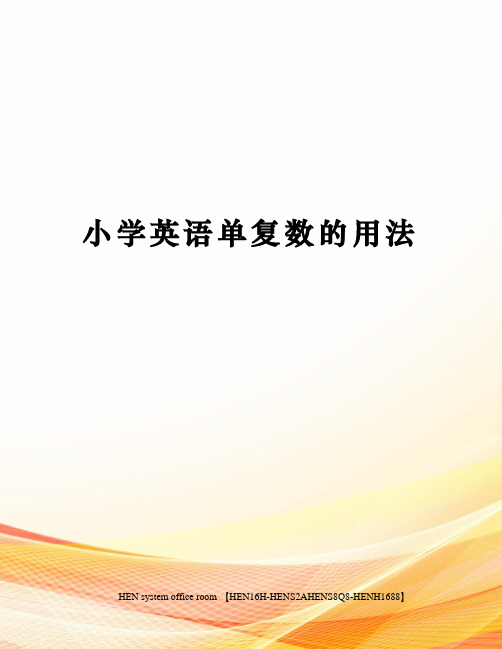
wolves
狼
wife
wives
妻子,太太
half
halves
半个
knife
knives
小刀,刀子
calf
calves
小牛
life
lives
(个人的)性命
sheaf
sheaves
捆,束,扎
thief
thieves
贼
leaf
leaves
叶子
二、结尾是o的单数词,一部份只加s就成复数词
单数
复数
词义
小学英语单复数的用法
小学英语不规则名词单复数总结
英语学习中,单复数语法说难也不难,但说他简单,又有一些复杂的地方!一般的名词加复数都是加S,但是也有很多的词语有特殊的变换方式!下面是英语单词单复数变化的一些特殊形式的总结!
一、以f 和fe结尾的单词规则:变f或fe为“ves”。
单数
复数
词义
单数
复数
词义
单数
复数
词义
piano
pianos
钢琴
photo
photos
照片,相片
radio
radios
收音机
bamboo
bamboos
竹子
zoo
zoos
动物园
kangaroo
kangaroos
袋鼠
三、结尾是o的有生命力的词,一般加“es” 口诀:黑人英雄吃西红柿马铃薯。
单数
复数
词义
单数
复数
词义
negro
negroes
goose
geese
鹅
八、以辅音字母y结尾的,变y为ies
小学阶段英语名词单数变复数总结

英语名词单数变复数归纳一、规则名词的复数形式:名词的复数形式,一般在单数形式后面加-s或-es。
具体如下:1 、一般情况在词尾加-s:如;map-maps, sea-seas, girl-girls, day-days2 、以s, x, ch, sh结尾的名词后加-es:如:class-classes, box-boxes, watch-watches(手表), dish-dishes(盘子), bus-buses3 、以-f或-fe结尾的词,变-f和-fe为v再加-es:如:leaf-leaves, thief-thieves(小偷,强盗), knife-knives, wolf-wolves(狼), wife-wives,self-selves(自己), shelf-shelves(书架,架子),half-halves(一半) life-lives(生命);歌谣:树叶半数自已黄妻拿刀割粮架窜狼像强盗逃命忙。
加-s:belief-beliefs(信仰), chief-chiefs(首领), proof-proofs(证据), roof-roofs(房顶), gulf-gulfs(海湾), handkerchief-handkerchieves(手帕)歌谣:海湾边、屋顶首领奴仆两相望;谁说信仰证据写手帕4 、以辅音字母加y结尾的名词,变y为i加-es :如:party-parties, family-families, story-stories, city-cities5 、以元音字母加y结尾的名词,或专有名词以y结尾的,加-s如:toy-toys, boy-boys, day-days, ray-rays, Henry-Henrys6、以辅音字母加-o结尾的名词一般加-es:如:hero-heroes, Negro-Negroes, potato-potatoes, tomato-tomatoes;黑人英雄爱吃土豆和西红柿。
小学英语六年级下语法-名词单复数there-be句型

语法复习:名词的单复数;there be与have一. 名词的单复数1. 可数名词单数变复数的规则(1)绝大多数的可数名词的复数形式,是在该词末尾加上后辍—s。
(读音变化:结尾是清辅音读[s],结尾是浊辅音或元音读[z]。
)例:friend→friends;cat→cats style→styles;sport→sports;desk→desks(2)凡是以s、x、ch、sh结尾的词,在该词末尾加上后辍—es构成复数。
(读音变化:统一加读[iz])例:bus→buses;fox→foxes ;match→matches;dish→dishes box→boxes(3)以辅音字母+y结尾的名词,将y改变为i,再加-es。
、(读音变化:加读[z])例:candy→candies;baby→babies; family→families;lady→ladies;story→stories*以元音字母+y 结尾的词,在词尾加s例:boy→boys;day→days;key→keys;toy→toys(4)以-o结尾的名词,有一些是加-es例:tomato→tomatoes;potato→potatoes; hero→heroes;(5)以—f或-fe结尾的名词,多为将-f或—fe改变为-ves.(读音变化:尾音[f]改读[vz])例:knife→knives;life→lives;leaf→leaves(6)不规则变化man-men, woman—women, policeman—policemen, policewoman—policewomen,mouse-mice,child-children ,foot-feet, tooth—teeth,fish—fish,people—people,Chinese—Chinese,Japanese-Japanese2. 不可数名词应该注意:(1). 不可数名词没有词形变化,前面不可以加冠词a,an修饰.(2)。
小学英语语法单复数

抽象名词——
表示情感,状态,品
质等抽象名称,如:love ,carelessness 个体 knifes pencil-boxes B.
her ____ watch ___
child ____
foot_____ book_____ dress ____
名词和集体名词多数可以用数目来计算,称为可 My cat had two fish for lunch.
小学英语语法
countries❖C2. 、普通名词:表示一类人或物或抽象概念的名
称。普通名词又可以分为四类: 个体名词—— 表 children D.
knifes pencil-boxes B. 4、不可数名词一般只有原形,没有复数形式,但是可以借助量词表示一定的数量。
示某类人或东西中的个体,如:student , ( )5 There is no ______ in the plate.
小学英语语法 小学英语语法单复数
小学英语语法
❖ 名词是指表示人和事物名称的词,可以分为专有 名词和普通名词两大类。
❖ 1、专有名词:特定的人、地方、机构等专有的名 称。第一个字母通常要大写。 e.g. Jim Green, New York, Bank of China,Peking University 星期、月份、节日、学科、报刊名也 是专有名词。 e.g. Monday,May, Christmas,Spring Festival,Maths,China Daily
❖ sheep-sheep policeman-policemen 品质等抽象名称,如:love ,carelessness 个体名词和集体名词多数可以用数目来计算,称为可数名词,有单、复数形式;
完整版)小学英语名词单复数练习题带答案

完整版)小学英语名词单复数练习题带答案1.Please write the plural form of the following words:(1'*50=50')cities。
zoos。
countries。
teeth。
mice。
boys。
brooms。
cars。
trees。
horses。
buses。
foxes。
branches。
babies。
families。
dishes。
s。
photos。
pianos。
knives。
leaves。
lives。
thieves。
men。
women。
children。
feet。
watches。
diaries。
days。
books。
dresses。
sheep。
teas。
boxes。
strawberries。
peaches。
sandwiches。
papers。
juices。
waters。
milks。
rice。
people。
oxen。
deer。
fish.2.Multiple Choice ns: (1'*10=10')1.The flowers in our yard are very beautiful.A。
clothB。
waterC。
flowers2.Tom is one of the Chinese boys in our school.A。
boyB。
XXXC。
boies (wrong spelling)3.A cat has four feet。
doesn't it?A。
foots (wrong spelling)B。
feetC。
feets (wrong spelling)4.There are three chairs and five tables in the room。
(missing word)5.XXX.6.The boy has two watches.7.XXX back to their country.8.XXX every day before she goes to bed.9.I saw many people in the street.10.XXX's.1.They come from different countries.2.How many tomatoes do you see in the picture?3.They are women XXX.4.Would you like two glasses of water。
(完整版)小学英语语法大全

小学英语语法大全一、名词复数规则1.一般情况下,直接加-s,如:book-books, bag-bags, cat-cats, bed-beds2.以s. x. sh. ch结尾,加-es,如:bus-buses, box-boxes, brush-brushes, watch-watches3.以“辅音字母y”结尾,变y为i, 再加-es,如:family-families, strawberry-strawberries4.以“f或fe”结尾,变f或fe为v, 再加-es,如:knife-knives ]Leaf——leaves5.不规则名词复数:man-men, woman-women, policeman-policemen, policewoman-policewomen,child-childrenfoot-feet,.tooth-teethfish-fish, people-people, Chinese-Chinese,Japanese-Japanese写出下列各词的复数I _________him _________this ___________her ______watch _______child _______photo ________diary ______day________ foot________ book_______ dress ________tooth_______ sheep ______box_______ strawberry _____peach______ sandwich ______dish_______bus_______man______ woman_______二、一般现在时一般现在时基本用法介绍【No. 1】一般现在时的功能1.表示事物或人物的特征、状态。
如:The sky is blue.天空是蓝色的。
2.表示经常性或习惯性的动作。
小学英语名词单数变复数口诀及规则

人有了知识,就会具备各种分析能力, 明辨是非的能力。 所以我们要勤恳读书,广泛阅读, 古人说“书中自有黄金屋。 ”通过阅读科技书籍,我们能丰富知识, 培养逻辑思维能力; 通过阅读文学作品,我们能提高文学鉴赏水平, 培养文学情趣; 通过阅读报刊,我们能增长见识,扩大自己的知识面。 有许多书籍还能培养我们的道德情操, 给我们巨大的精神力量, 鼓舞我们前进。
小学英语名词单数变复数口诀及 规则
• 辅音 + y 在词尾,把 y 变 i 再加 -es; • study-studies; baby-babies; city-cities • 元音+y在词尾, 只加s就足够
• boy – boys ; day – days; monkey – monkeys • 词尾字母若是 o,常用三个已足够,
要加 -es 请记好,hero, tomato, potato。 • 美国黑人和英雄爱吃土豆和西红柿。
• negro-negroes; hero-heroes; potato-potatoes; tomato-tomatoes
• 其余o结尾的词加s, photo-photos; pianopianos
• (二) 不规则变化
• 男人女人 a 变 e,鹅足牙 oo 变 ee; • man-men; woman-women; goose-geese;
foot-feet; tooth-teeth • 老鼠虱子也好记,ous 变 ic; • mouse-mice; louse-lice • 孩子加上 ren,鱼鹿绵羊不用变 • child-children; fish; deer; sheep • this---these(这些) I --- we he/she--- they • that -- those(那些)
小学级英语基础知识汇总完整版
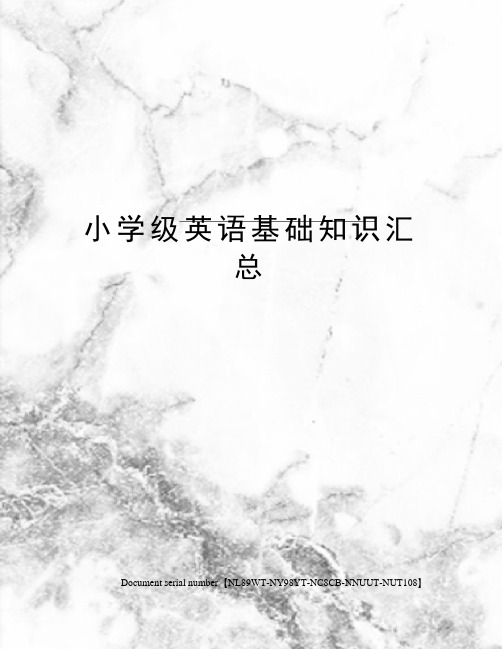
小学级英语基础知识汇总Document serial number【NL89WT-NY98YT-NC8CB-NNUUT-NUT108】小学1-6年级英语基础知识汇总{ 第一部分}基础知识1.字母:26个字母的大小写A B C D E F G H I J K L M N O P Q R S T U V W X Y Za b c d e f g h i j k l m n o p q r s t u v w x y z2.音标:48个音标3.词汇:词汇量,近反义词4.句子:大小写,标点符号{ 第二部分 }语法知识一.名词:名词单复数,名词的格(一)名词单复数1.一般情况,直接加-s,如:b o o k-b o o k s,b a g-b a g s,c a t-c a t s,b e d-b e d s2.以s.x.s h.c h结尾,加-e s,如:b u s-b u s e s,b o x-b o x e s,b r u s h-b r u s h e s,w a tc h-w a t c h e s3.以“辅音字母+y”结尾,变y为i,再加-e s,如:f a m i l y-f a m i l i e s,s t r a w b e r r y-s t r a w b e r r i e s4.以“f或f e”结尾,变f或f e为v,再加-e s,如:k n i f e-k n i v e s5.不规则名词复数:m a n-m e n,w o m a n-w o m e n,p o l i c e m a n-p o l i c e m e n,p o l i c e w o m a n-p o l i c e w o m e n,m o u s e-m i c ec h i l d-c h i ld re n,f o o t-f e e t,t o o t h-t e e t h,f i s h-f i s h,p e o p l e-p e o p l e, C h i n e s e-C h i n e s e,J a p a n e s e-J a p a n e s e不可数名词的复数就是原型:p a p e r,j u i c e,w a t e r,m i l k,r i c e,t e a(二)名词的格(1)有生命的东西的名词所有格:a)单数后加’s如:L u c y’s r u l e r m y f a t h e r’s s h i r tb)以s结尾的复数名词后加’如:h i s f r i e n d s’b a g sc)不以s结尾的复数后加’s c h i l d r e n’s s h o e sl并列名词中,如果把’s加在最后一个名词后,表示共有,如:T o m a n d M i k e’s c a r汤姆和迈克共有的小汽车l要表示所有物不是共有的,应分别在并列名词后加’sT o m’s a n d M i k e’s c a r s汤姆和麦克各自的小汽车(2)表示无生命东西的名词通常用“o f+名词”来表示所有关系:如:a p i c t u r e o f t h e c l a s s r o o m a m a p o f C h i n a二.冠词:不定冠词,定冠词种类:(1)不定冠词:a/a n元音开头的可数名词前用a n:a n e g g/a n a p p l e/a n o r a n g e/a n e r a s e r/a n a n s w e r/a n I Dc a r d/a n a l a r m c l o c k/a n a c t o r/a n a c t r e s s/a n e-m a i l/a na d d r e s s/a n e v e n t/a n e x a m p l e/a n o p e r a/a n h o u r a n o l d m a n/a n i n t e r e s t i n gb o o k/a n e xc i t i n g s p o r t/a n a c t i o n m o v i e/a n a r tl e s s o n/(2)定冠词:t h e定冠词的用法:(1)特指某(些)人或某(些)物:T h e r u l e r i s o n t h e d e s k.(2)复述上文提到的人或物:H e h a s a s w e a t e r.T h e s w e a t e r i s n e w.(3)谈话双方都知道的人或物:T h e b o y s a r e n’t a t s c h o o l.(4)在序数词前:J o h n’s b i r t h d a y i s F e b r u a r y t h e s e c o n d.(5)用于固定词组中:i n t h e m o r n i n g/a f t e r n o o n/e v e n i n g不用冠词的情况:(1)专有名词前:C h i n a i s a b i g c o u n t r y.(2)名词前有定语:t h i s,t h a t,m y,y o u r,s o m e,a n y,n o等:T h i s i s m y b a s e b a l l.(3)复数名词表示一类人和事:M o n k e y s c a n’t s w i m.T h e y a r e t e a c h e r s.(4)在节日,日期,月份,季节前:T o d a y i s C h r i s t m a s D a y.I t’s S u n d a y.(5)一日三餐前:W e h a v e b r e a k f a s t a t6:30.(6)球类棋类运动前:T h e y o f t e n p l a y f o o t b a l l a f t e r c l a s s.H e p l a y sc h e s s a t h o m e.*但乐器前要用定冠词:I p l a y t h e g u i t a r v e r y w e l l.(7)学科名称前:M y f a v o r i t e s u b j e c t i s m u s i c.(8)在称呼或头衔的名词前:T h i s i s M r L i.(9)固定词组中:a t n o o n a t n i g h t b y b u s三、代词、形容词、副词代词:人称代词,物主代词人称代词物主代词主格宾格第一人称单数I(我)m e m y(我的)复数w e(我们)u s o u r(我们的)第二人称单数y o u(你)y o u y o u r(你的)复数y o u(你们)y o u y o u r(你们的)第三人称单数h e(他)h i m h i s(他的)s h e(她)h e r h e r(她的)i t(它)i t i t s(它的)复数t h e y(他们/她们/它们)t h e m t h e i r(他们的/她们的/它们的)形容词,副词:比较级,最高级(一)、形容词的比较级1、形容词比较级在句子中的运用:两个事物或人的比较用比较级,比较级后面一般带有单词t h a n。
(完整版)小学英语名词单复数练习题带答案
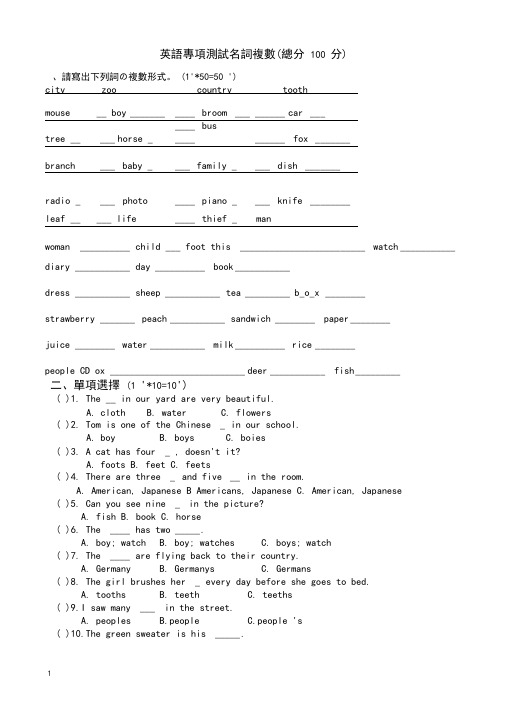
英語專項測試名詞複數(總分100 分)、請寫出下列詞の複數形式。
(1'*50=50 ')woman __________ child ___ foot this _________________________ watch ___________ diary ___________ day __________ book ___________dress ___________ sheep ___________ tea _________ b_o_x ________strawberry _______ peach ___________ sandwich ________ paper ________juice ________ water ___________ milk __________ rice ________people CD ox ___________________________ deer ___________ fish _________二、單項選擇(1 '*10=10')( )1. The __ in our yard are very beautiful.A.clothB. waterC. flowers( )2. Tom is one of the Chinese _ in our school.A.boyB. boysC. boies( )3. A cat has four _ , doesn't it?A.footsB. feetC. feets( )4. There are three _ and five __ in the room.A. American, Japanese B Americans, Japanese C. American, Japanese( )5. Can you see nine _ in the picture?A. fishB. bookC. horse( )6. The ____ has two _____ .A. boy; watchB. boy; watchesC. boys; watch( )7. The ____ are flying back to their country.A. GermanyB. GermanysC. Germans( )8. The girl brushes her _ every day before she goes to bed.A. toothsB. teethC. teeths( )9.I saw many ___ in the street.A. peoplesB.peopleC.people 's( )10.The green sweater is his _____ .A.brotherB.brothers 三、選擇填空 (1 '*10=10')( )1. They come from different ____A. countryB. countriesC. a countryD. countrys( )2. How many _______ do you see in the picture?A. tomatosB. tomatoesC. tomatoD. the tomato( )3. They are ______ .A . woman teachers C. women teacher ( )4. Would you like ______ ,please?答案:C.brother 'sB. women teachersD. woman teacherA. two glass ofwaterC. two glass of waters ( )5. Most of ______ live in B. two glasses of waterD. two glasses ofB. German, GermenC. Germen, GermanyD. Germans, Germany( )6. There are some ______ in these ____ .A. knifes pencil-boxesB. knives pencils-boxC. knives pencil-boxD. knives )7.like _________ by air. pencils-boxes A. Greens, travelling B. The Green, traveling C. The Greens, travel D. The Greens, traveling ( )8.I wonder why ____________ are interested in actionfilms(武打片 ).A. the peopleB. peopleC. peoplesD. the peoples( )9. There is no _____ in the plate.A. applesB. orangesC. riceD. eggs ( )10.My unclehas three ___________________ .A.childB.childsC.childrenD.childrens 四. 填入所給名詞の正確形式 (2 '*10=20')1. I have two _________ (knife)2. There are many _________ here. (box)3. There are many _________ on the road. (bus)4. A few _________ are drawing on the wall. (boy)5. The _____________ are playing football now. (child)6. Please take two ____________ for me. (photo)7. I like the red ___________ .(tomato)8. Would you please clean your _________ now? (tooth)9. Do you want some _______ ? (milk)10. There are ten _______ __________in our school. (womanteacher)一、請寫出下列詞の複數形式。
中小学英语语法(名词单复数)
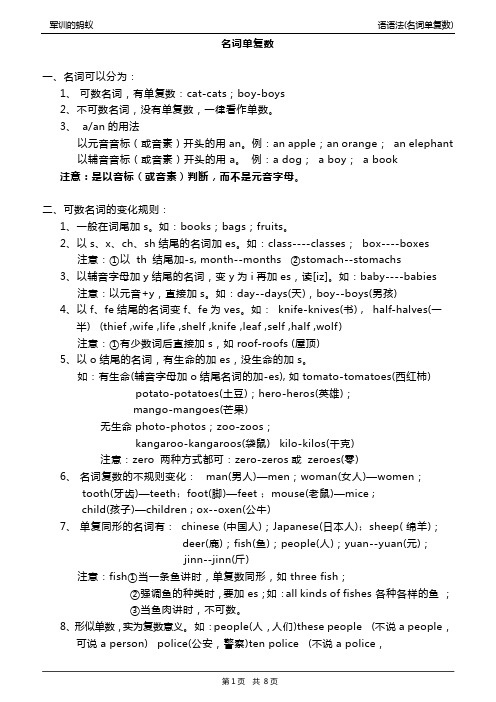
如 passer-by--passers-by(过路人);bus driver--bus drivers(汽车司机)
注意:
①如果没有主体名词,就在最后一词上加-s。如:grown-up--grown-ups
(成年人) letter-box-letter-boxes (信箱)
②hair 和 fruit 通常作单数,表示总体。若表示若干根头发或若干种水果,
第1页 共 8页
军训的蚂蚁
语语法(名词单复数)
可说 a policeman)
9、不可数名词,没有单复数。如:water(水);milk(牛奶);tea(茶);rice(米饭);
orange(橙汁);juice(果汁);bread(面包);hair(头发)
10、合成名词变为复数时,通常只将里面所含的主体名词变为复数。
11、有些名词只有作复数。
如:scissors(剪刀);trousers(裤子);shorts(短裤);jeans(工装裤) :
compasses(两脚规);scales(天平);sunglasses(太阳镜);
surroundings(环境);savings(储蓄);writings(作品)
12、表示“某国人”的名词复数形式变化可通过歌诀记忆:中日不变英法变,其余-s 加
后面。例如:Chinese → Chinese; Japanese → Japanese;
Englishman → Englishmen;Englishwoman → Englishwomen;
Frenchman→ Frenchmen, Frenchwoman → Frenchwomen;
American → Americans;Rusian → Rusians;
小学英语四上语法专题名词单复数
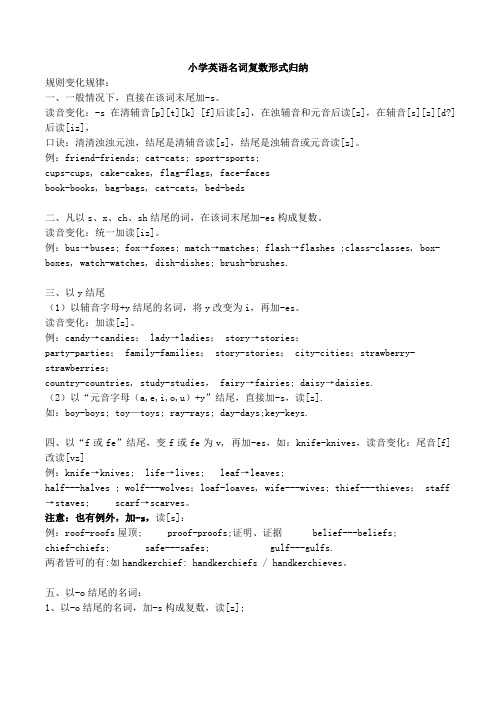
小学英语名词复数形式归纳规则变化规律:一、一般情况下,直接在该词末尾加-s。
读音变化:-s在清辅音[p][t][k] [f]后读[s],在浊辅音和元音后读[z],在辅音[s][z][d?]后读[iz],口诀:清清浊浊元浊,结尾是清辅音读[s],结尾是浊辅音或元音读[z]。
例:friend-friends; cat-cats; sport-sports;cups-cups, cake-cakes, flag-flags, face-facesbook-books, bag-bags, cat-cats, bed-beds二、凡以s、x、ch、sh结尾的词,在该词末尾加-es构成复数。
读音变化:统一加读[iz]。
例:bus→buses; fox→foxes; match→matches; flash→flashes ;class-classes, box-boxes, watch-watches, dish-dishes;brush-brushes.三、以y结尾(1)以辅音字母+y结尾的名词,将y改变为i,再加-es。
读音变化:加读[z]。
例:candy→candies; lady→ladies; story→stories;party-parties; family-families; story-stories; city-cities;strawberry-strawberries;country-countries, study-studies, fairy→fairies; daisy→daisies.(2)以“元音字母(a,e,i,o,u)+y”结尾,直接加-s,读[z].如:boy-boys; toy—toys; ray-rays; day-days;key-keys.四、以“f或fe”结尾,变f或fe为v, 再加-es,如:knife-knives,读音变化:尾音[f]改读[vz]例:knife→knives; life→lives; leaf→leaves;half---halves ; wolf---wolves;loaf-loaves, wife---wives; thief---thieves; staff →staves; scarf→scarves。
(完整版)小学英语语法-名词单复数变化规则记忆顺口溜
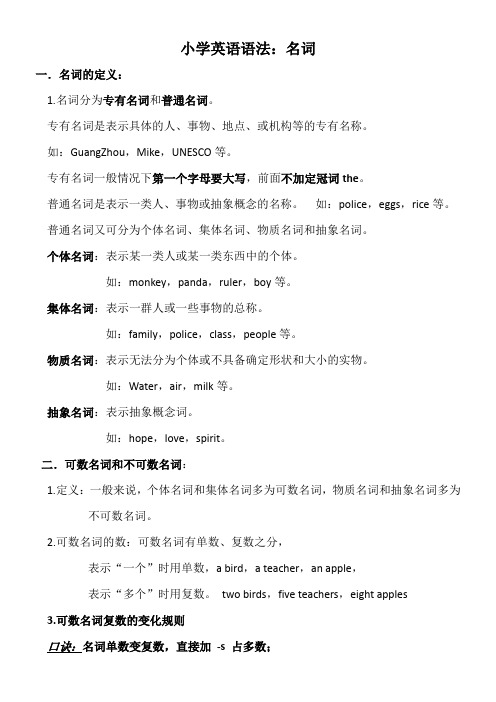
小学英语语法:名词一.名词的定义:1.名词分为专有名词和普通名词。
专有名词是表示具体的人、事物、地点、或机构等的专有名称。
如:GuangZhou,Mike,UNESCO等。
专有名词一般情况下第一个字母要大写,前面不加定冠词the。
普通名词是表示一类人、事物或抽象概念的名称。
如:police,eggs,rice等。
普通名词又可分为个体名词、集体名词、物质名词和抽象名词。
个体名词:表示某一类人或某一类东西中的个体。
如:monkey,panda,ruler,boy等。
集体名词:表示一群人或一些事物的总称。
如:family,police,class,people等。
物质名词:表示无法分为个体或不具备确定形状和大小的实物。
如:Water,air,milk等。
抽象名词:表示抽象概念词。
如:hope,love,spirit。
二.可数名词和不可数名词:1.定义:一般来说,个体名词和集体名词多为可数名词,物质名词和抽象名词多为不可数名词。
2.可数名词的数:可数名词有单数、复数之分,表示“一个”时用单数,a bird,a teacher,an apple,表示“多个”时用复数。
two birds,five teachers,eight apples3.可数名词复数的变化规则口诀:名词单数变复数,直接加-s 占多数;s, x, z, ch, sh 来结尾,直接加上-es;词尾是 f 或fe,加-s 之前先变ve;辅母+ y 在词尾,把y 变i 再加-es;词尾字母若是o,常用四个已足够,要加-es 请记好,黑人英雄吃土豆西红柿. A、一般情况下,在单数名词的后面加-s构成。
如:game-games,boy-boys等。
B、以s、x、sh、ch结尾的单数名词变复数,在词尾加-es构成。
如:box-boxes,bus-buses,peach-peaches,dish-dishes。
C、以o结尾,表示有生命的事物的单数名词变复数加-es;口诀:黑人和英雄吃土豆和西红柿+esnegroes and heroes eat tomatoes and potatoes表示没有生命的事物的单数名词变复数加-s。
(完整版)小学1至6年级英语单词
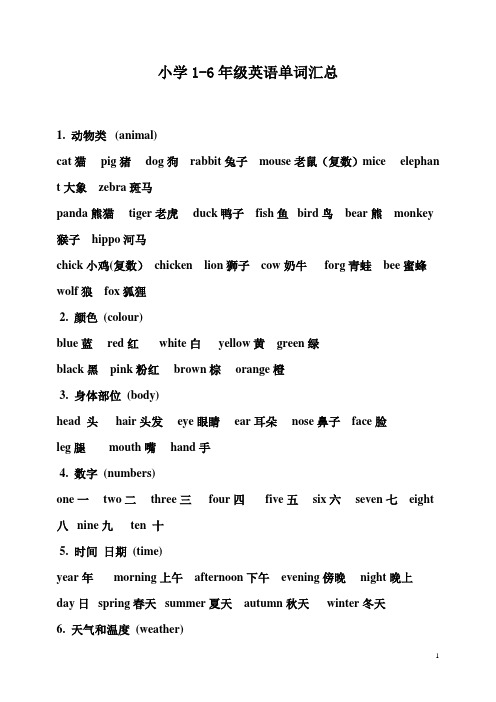
小学1-6年级英语单词汇总1. 动物类(animal)cat猫pig猪dog狗rabbit兔子mouse老鼠(复数)mice elephan t大象zebra斑马panda熊猫tiger老虎duck鸭子fish鱼bird鸟bear熊monkey 猴子hippo河马chick小鸡(复数)chicken lion狮子cow奶牛forg青蛙bee蜜蜂wolf狼fox狐狸2. 颜色(colour)blue蓝red红white白yellow黄green绿black黑pink粉红brown棕orange橙3. 身体部位(body)head 头hair头发eye眼睛ear耳朵nose鼻子face脸leg腿mouth嘴hand手4. 数字(numbers)one一two二three三four四five五six六seven七eight 八nine九ten 十5. 时间日期(time)year年morning上午afternoon下午evening傍晚night晚上day日spring春天summer夏天autumn秋天winter冬天6. 天气和温度(weather)cold冷的cool凉爽的warm温暖的hot热sunny晴朗的cloudy多云的windy有风的rainy下雨的snowy下雪的7. 交通工具car小汽车bicycle自行车van面包车8. 食物饮料三餐味道水果dinner晚饭,正餐 (food)食物rice 米饭noodles面条egg蛋cake蛋糕mooncake月饼hot dog热狗hamburger汉堡包noodles面条soup汤chicken鸡肉meat肉fish鱼pizza匹萨pie派jelly果冻sweet糖果bicuit饼干(drink)饮料water水juice果汁Coke可乐ice-cream冰激凌ice冰milk牛奶(fruit)水果orange桔子apple苹果pear梨banana香蕉lemon柠檬peach桃子9.职业(jobs)farmer农民teacher教师10. 反义词big---small大的/小的long ---short长的/短的tall--- short高的/矮的thin--- fat瘦的/胖的new---old新的/旧的old ---young年长的/年青的cold ---hot冷的/热的go---come 来/去up---down 上/下yes----- no是/不11. 衣服(clothes)T-shirt T恤衫shirt衬衫skirt短裙dress连衣裙shorts短裤blo use女式衬衫12.地方(place)home家room房间kitchen厨房classroom教室park公园zoo动物园garden花园13. 代词I 我you你he他she她it它we我们you 你们they 他(她、它)们my我的your你的his 他的her她的its它的our我们的your你们的their他(她、它)们的me我(宾格) you him her14.方位及方位介词in在…里on在…上under在…下面15.心情及患病happy高兴的16.自然景物sky天空sun太阳cloud云wind风rain雨star星星moon 月亮17.疑问词what什么what color什么颜色what time什么时间why为什么who 谁where哪里when什么时候how多么,怎样how old几岁how many多少(hi hello)打招呼good好goodbye再见do坐can能、会be动词是(is are am)(have has)有give给like喜欢of属于---的for为、对---please请 thank谢谢nice美丽but但是19.植物(plant)tree树flower花grass草forest森林20. 动词及词组swim游泳fly飞jump跳run跑ride骑look看skip跳play玩eat吃sit坐drink water喝水dance跳舞read阅读sing唱歌draw画画look at向、朝----看 go home回家go swimming去游泳read a book看书sing and dance唱歌跳舞fly kites 放风筝ride a bicycle骑车cook dinner做晚饭21.文具、家具等物品bag书包pen钢笔pencil铅笔ruler尺子rubber橡皮book书penc il-case铅笔盒chair椅子desk课桌table桌子TV电视window窗户box盒子te acher’s desk讲台22. 性别及家庭成员boy 男孩girl女孩Mrs 女士Mr.先生Miss小姐mother母亲mum妈妈(口语)father 父亲dad爸爸(口语)parents 父母grandmother祖母grandma奶奶(口语)grandfather祖父grandpa爷爷(口语)uncle叔叔aunt阿姨sister姐妹brother兄、弟man男人friend朋友23.玩具ball球doll洋娃娃kite风筝bicycle自行车umbrella伞gift礼物card卡firecracker鞭炮firework烟火window窗slide滑滑梯swing秋千seesaw翘翘板net网24.形容词smooth光滑的soft柔软的二、句型1.单数用is,复数用are 列:My nose is small,but my eyes are big.2.三个be动词的用法列:I ---- am搞清楚三种人称you ----- arehe\she\it------is3.What do you see/hear? I see/hear ----.What can you see/hear? I can see/hear -----.4.like+名词复数列:I like apples.like to +动词I like to swim.5.for+宾格列;It's for me.6.How many+名词复数列:How many bowls?there is+名词单数There is a bowl./There is one.there are+名词复数There are four bowls.there is some + 不可数名词There is some water.7.人称+like 列:I/You like-------.she/he/it likes -------.英语三年级Unit 1boy 男孩 girl 女孩teacher 教师student 学生this 这个my 我的friend 朋友I’m=I am 我是nice 好的;愉快的good morning 早上好good afternoon 下午好meet 遇见;碰见goodbye 再见too 也;太Unit 2father 父亲;爸爸dad 爸爸(口语)mother 母亲;妈妈mom 妈妈(口语)man 男人woman 女人grandmother (外)祖母grandma (口语)(外)祖母grandfather (外)祖父grandpa (口语)(外)祖父sister 姐妹brother 兄妹let’s=let us 让我们great 太好了really 真地;确切地and 和;并且how 多么;怎么样Unit 3eleven 十一twelve 十二thirteen 十三fourteen 十四fifteen 十五sixteen 十六seventeen 十七eighteen 十八nineteen 十九twenty 二十 how many 多少can 能够;可以look at 看;瞧Unit 4peach 桃pear 梨orange 橙子watermelon 西瓜apple 苹果banana 香蕉strawberry 草莓grape 葡萄like 喜欢some 一些;某些thanks 多谢Unit 5bus 公共汽车bike 自行车taxi 出租车jeep 吉普车desk 课桌chair 椅子walkman 随身听lamp 台灯your 你的;你们的zoo 动物园Unit 6small 小的big 大的long 长的short 短的;矮的tall 高的giraffe 长颈鹿deer 鹿四年级上册四会单词词汇表Unit 1computer(计算机) board(写字板) fan(风扇) light(灯) this(这;这个) is(是)my(我的) that(那;那个) your(你的) teacher’s desk(讲台) picture(图画;照片) wall(墙壁) floor(地板) yes(是;是的) it(它)Unit 2one(一) two(二) three(三) four(四) five(五) six(六) seven(七) eight(八) nine(九) ten(十) what(什么) time(时间) it’s=itis …o’clock(…点钟) math(数学) Chinese(语文) English(英语)P.E.(体育) music(音乐) for(为;给) class(课程)Unit 3jacket(夹克衫) shirt(衬衫) skirt(裙子) dress(连衣裙) T-shirt(T恤衫) red(红色的) blue(蓝色的) yellow(黄色的) green(绿色的) white(白色的) no(不;不是) not(不;不是的) colour(颜色)Unit 4warm(暖和的) cold(寒冷的) cool(凉爽的) today(今天) jeans(牛仔裤) pants(长裤) socks(袜子) shoes(鞋子) let’s=let us play(玩;踢) football(足球) snowy(下雪的) sunny(晴朗的)Unit 5how much(多少钱) big(大的) small(小的) long(长的) short(短的) apple(苹果) banana(香蕉) pear(梨) orange(橙子) watermelon(西瓜) are(是) they 它(他、她)们Unit 6horse(马) aren’t=are not c at(猫) rabbit(兔子) pig(猪) duck(鸭子) dog(狗) eleven(十一) twelve(十二) thirteen(十三) fifteen(十五) twenty(二十) how many(多少) there(那儿;那里)四年级下册四会单词词汇表Unit 1computer(计算机) board(写字板) fan(风扇) light(灯) this(这;这个) is(是) my(我的) that(那;那个) your(你的) teacher’s desk(讲台) picture(图画;照片) wall(墙壁) floor(地板) yes(是;是的) it(它) Unit 2one(一) two(二) three(三) four(四) five(五) six(六) seven(七) eight(八) nine(九) ten(十) what(什么) time(时间) it’s=itis …o’clock(…点钟) math(数学) Chinese(语文) English(英语)P.E.(体育) music(音乐) for(为;给) class(课程)Unit 3jacket(夹克衫) shirt(衬衫) skirt(裙子) dress(连衣裙) T-shirt(T 恤衫) red(红色的) blue(蓝色的) yellow(黄色的) green(绿色的)white(白色的) no(不;不是) not(不;不是的) colour(颜色) Unit 4warm(暖和的) cold(寒冷的) cool(凉爽的) today(今天) jeans(牛仔裤) pants(长裤) socks(袜子) shoes(鞋子) let’s=let us play(玩;踢) football(足球) snowy(下雪的) sunny(晴朗的)Unit 5how much(多少钱) big(大的) small(小的) long(长的) short(短的) apple(苹果) banana(香蕉) pear(梨) orange(橙子) watermelon(西瓜) are(是) they 它(他、她)们Unit 6horse(马) aren’t=are not cat(猫) rabbit(兔子) pig(猪) duck(鸭子) dog(狗) eleven(十一) twelve(十二) thirteen(十三) fifteen(十五) twenty(二十) how many(多少) there(那儿;那里)五年级上册四会单词词汇表Unit 1Young (年轻的) funny (滑稽可笑的) tall (高的)strong (强壮的) kind (和蔼的、亲切的) old (年老的) short (矮的)thin (瘦的) Mr (先生) like (像、喜欢) strict (严格的) smart (聪明的、巧妙的) active (积极的、活跃的) quiet (安静的、文静的)very (很、非常) but (但是)Unit 2Mondy (星期一) Tuesday (星期二) Wednesday (星期三) Thursday (星期四) Friday (星期五) Saturday (星期六) Sunday (星期天) day (天) have (有、吃) on (在…..时候) do homework (做作业) watch TV (看电视) read books (读书)Unit 3eggplant (茄子) fish (鱼) green beans (青豆) tofu (豆腐) potato (土豆) tomato (西红柿) for (为) lunch (中餐) we (我们) tasty (好吃的) sweet (甜的) sour (酸的) fresh (新鲜的) salty (咸的) favourite (最喜欢的) they are (他们是) fruit (水果) grape (葡萄)Unit 4Cook the meals (倒垃圾) water the flowers (浇花) sweep the floor (扫地) clean the bedroom (打扫卧室) make the bed (铺床) set the table (摆饭桌)wash the clothes (洗碗碟) do the dishes (收拾衣服) use a computer (使用计算机)Unit 5curtain (空调) trash bin (垃圾箱) closet (壁橱) mirror (镜子) end table (床头柜) bedroom (卧室) kitchen (厨房) bathroom(卫生间) living room (客厅) in (在…里面) on (在…上面) under (在…下面) near (在..旁边) behind (在…后边) clothes (衣服)Unit 6river (河流) flower (花) grass (草) lake (湖泊) forest (森林) path (路) pake (公园) picture (照片) hourse (房子) bridge (桥) tree (树) road (公路) building (建筑物) clean (干净的)五年级下册四会单词词汇表Unit 1do morning exercises(晨练) eat breakfast(吃早饭) have english class (上英语课) play sports(进行体育运动) eat dinner(吃晚饭) when (什么时候) evening(夜晚;晚上) get up(起床) at(在……点钟)usually(通常;一般) noon(中午) climb mountains(爬山) go shopping (购物;买东西) play the piano(弹钢琴) visit grandparents(看望祖父母) go hiking(去远足) weekend(周末) often(经常) sometimes (有时候)Unit 2spring(春天) summer(夏天) fall(秋天) winter(冬天) season 季节) which(哪一个) best(最;极) swim(游泳) fly kites(放风筝) skate(滑冰;滑冰鞋) make a snowman(堆雪人) plant trees(种树) why(为什么) because(因为) sleep(睡觉)Unit 3Jan./January(一月) Feb./February(二月) Mar./March(三月)Apr./April(四月) May(五月) June(六月) July(七月) Aug./Augest (八月) Sept./September(九月) Oct./October(十月) Nov./November (十一月) Dec./December(十二月) birthday(生日) uncle(叔叔;舅舅) her(她的) date(日期)Unit 4draw pictures(画画)cook dinner(做饭) read a book(看书)answer the phone(接电话) listen to music9(听音乐) clean the room(打扫房间) write a letter(写信)write an e-mail(写电子邮件) mom (妈妈)grandpa(爷爷;外公)study(书房)Unit 5fly(飞) jump(跳) walk(走) run(跑) swim(游泳) kangaroo (袋鼠) sleep(睡觉) climb(往上爬) fight(打架) swing(荡;荡秋千) drink water(喝水)Unit 6take pictures(照相) watch insects(观察昆虫) pick up leaves(采摘树叶) do an experiment(做实验) catch butterfly(捉蝴蝶) honey (蜂蜜) count insects(数昆虫) collect leaves(收集树叶) wtite a report(写报告) play chess(下棋) have a picnic(举行野餐)六年级上册四会单词词汇表Unit 1by (经,乘) foot(脚) bike(自行车) bus(公共汽车) train(火车) how(怎样) go to school(上学) traffic(交通) traffic light(交通灯) traffic rule(交通规则) stop(停,停车站)wait(等待) get to(到达)Unit 2library(图书馆) post office(邮局) hospital(医院) cinema(电影院) bookstore(书店) where(在哪里,到哪里) please(请) next to(与…相邻) turn(转弯) right (右边) left(左边) straight(成直线地) then (然后) Unit 3next week(下周) this morning(今天上午) this afternoon(今天下午) this evening (今天晚上) comic book(漫画书) post card(明信片) newspaper(报纸) buy(购买)Unit 4hobby(爱好) ride a bike--riding a bike(骑自行车) dive--diving(跳水) play the violin—playing the violin(拉小提琴) make kites—making kites(制作风筝) collect stamps—collecting stamps(集邮) live–lives(居住) teach--teaches(教) go--goes(去) watch--watches(看) read--reads(读,看) does doesn’t=does notUnit 5singer(歌唱家,歌手) writer(作家) actor(男演员) actress(女演员) artist(画家) TV reporter(电视台记者) engineer(工程师) accountant(会计) policeman(男警察) salesperson(销售员) cleaner(清洁工) where(在哪里,到哪里) work(工作)Unit 6rain(雨) cloud (云) sun(太阳) stream(河,溪) come from(来自,从…来) seed(种子) soil(土壤) sprout (苗,芽) plant(植物,种植) should (应该) then(然后)六年级下册四会单词词汇表Unit 1tall—taller更高的 short—shorter 更矮的 strong—stronger 更强壮的 old—older 年龄更大的 young—younger 更年轻的 big—bigger 更大的heavy—heavier 更重的 long—longer 更长的 thin—thinner 更瘦的small—smaller (体型)更小的Unit 2have a fever 发烧 have a sore throat喉咙疼 have a cold感冒 have a toothache 牙疼 have a headache 头疼 matter事情,麻烦 sore 疼的hurt疼痛 nose 鼻子 tired疲劳的,累的 excited兴奋的 angry生气的happy高兴的 bored无聊的,烦人的 sad 忧伤的,悲伤的Unit 3watch—watched 看 wash—washed 洗 clean—cleaned打扫play—played玩 visit—visited 看望 do—did last weekend 上一个周末 go—went去 go to a park—went to a park 去公园 go swimming—went swimming去游泳 go fishing—went fishing去钓鱼 read—read 读 go hiking—went hiking 去郊游Unit 4leran Chinese—learned Chinese学汉语 sing and dance—sang and danced 唱歌和跳舞 eat good food—ate good food吃好吃的食物 take pictures—took pictures 照相 climb—climbed 爬 have—had buy presents—bought presents买礼物 row a boat—rowed a boat 划船 see elephant—saw elephant 看大象 go skiing—went skiing 去滑雪 goice-skating—went ice-skating 去滑冰 how怎么,如何 get—got 到达last 上一个的,仅余的,留在最后的。
(完整版)人教版小学英语单词表

PEP小学英语总汇三年级上册Unit 1pen:[pen]钢笔pencil:['pensl]铅笔pencil-case:['penslkeis]铅笔盒ruler:['ru:lə]尺子eraser:[i'reisə]橡皮crayon:['kreiən]蜡笔book:[buk]书bag:[bæg]书包sharpener:['ʃɑ:pənə]卷笔刀school :[sku:l]学校hello 【hə'ləu] 喂hi [ hai ] 喂I’m =I ammy [maɪ] 我的name [neim] 名字goodbay ['ɡud'bai]再见bye [ bai ] 再见(口语)what [ wɔt]什么is [ iz ]是your[jɔ:] 你的;你们的you [ju:]你;你们三年级上册Unit 2head:[hed]头face [feis]脸nose:[nəuz]鼻子mouth:[mauθ]嘴eye:[ai]眼睛ear:[iə]耳朵arm:[ɑ:m]胳膊finger['fiŋgə]手指leg:[leg]腿foot:[fut]脚body:['bɔdi]身体good [ɡud] 好的morning['mɔ:niŋ]早晨;上午this [ ðis]这;这个nice [nais] 好的meet [mi:t]见面;遇见;go [ ɡəu ] 去ok 好to [tu:] 给,momafternoon[,ɑ:ftə:'nu:n]下午午后. too[ tu: ]也;太三年级上册Unit 3red:[red]红色的yellow:['jeləu]黄色的green:[gri:n]绿色的blue:[blu:]蓝色的purple:['pə:pl]紫色的white:[hwait]白色的black:[blæk]黑色的orange:['ɔ:rindʒ]橙色的pink:[piŋk]粉色的brown:[braun]棕色的how [ hau ]如何;怎样.are [ɑ:]是fine [ fain ] 好的thank [θæŋk谢谢thanks [θæŋks]多谢paint [ peint ]绘画great [ ɡreit ]很好的三年级上册Unit 4cat:[kæt]猫dog:[dɔg]狗monkey:['mʌŋki]猴子panda:['pændə]熊猫rabbit:['ræbit]兔子duck:[dʌk]鸭子pig:[pig]猪bird [bə:d]鸟bear:[bɛə]熊elephant:['elifənt]大象mouse:[maus]老鼠squirrel:['skwirəl]松鼠look athave[ hæv]有;吃super [ 'sju:pə ]太棒了太zoo [zu:] 动物园really ['riəli] 真正的;确实may [ mei ]可以;可能. sure [ʃuə] 的确,一定like [ laik ] 喜欢.it [ it ]它三年级上册Unit 5cake:[keik]蛋糕bread :[bred] 面包 hot dog :[h ɔt][d ɔg] 热狗 hamburger :['hæmb ə:g ə]汉堡包 chicken :['t ʃikin] 鸡肉 French fries 榨薯条 Coke 可乐juice :[d ʒu:s] 果汁 milk :[milk] 牛奶 water :['w ɔ:t ə] 水 tea :[ti:] 茶 coffee :['k ɔfi] 咖啡 some [ s ʌm]一些 and [ænd] 和 no [ n əu ] 不;不是French[ frent ʃ] 法国的;法国人;法语;法语的三年级上册Unit 6 one :[w ʌn] 一 two :[tu:] 二 three :[θri:] 三 four :[f ɔ:] 四 five :[faiv] 五six :[siks] 六 seven :['sevn] 七 eight :[eit] 八 nine :[nain] 九 ten :[ten]十 doll :[d ɔl] 玩具娃娃 boat :[b əut] 小船 ball :[b ɔ:l] 球 kite :[kait] 风筝 balloon :[b ə'lu:n] 气球 car :[k ɑ:]小汽车 plane :[plein] 飞机 friend [frend ]朋友 for [f ɔ: ]为;给happy [ 'hæpi ] 快乐的;幸福的 birthday[ 'b ə:θdei ]生日 how old [hau] [ əuld ] 几岁 eat[ i:t ] 吃. how many 许多 gift [ɡift ] 礼物 三年级下册Unit 1 boy :[b ɔi] 男孩girl:[gə:l]女孩teacher:['ti:tʃə]教师student:['stju:dənt]学生this:[ðis]这个my:[mai]我的friend:[frend]朋友I’m=I am 我是nice:[nais]好的愉快的good morning :[gud]['mɔ:niŋ]早上好good afternoon:[gud]['ɑ:ftə'nu:n]下午好meet:[mi:t]遇见;碰见goodbye:[,gud'bai]再见too :[tu:]也;太welcome [ 'welkəm ]欢迎back [ bæk ] 回来.new [ nju:]新的where [wɛə]哪里you [ ju:]你;你们your [jɔ:]你的;你们的America [ə'merikə]美国see [ si: ]看见say [sei ]说;讲again [ ə'ɡen]又;再class [ klɑ:s]班级;课程we [wi:]我们today [ tə'dei ]今天watch out [wɔtʃ] [aut ]小心;留神sorry [ 'sɔ:ri]对不起ant [ ænt ] 蚂蚁.apple [ 'æpl ] 苹果.Come in [ kʌm ] [in]进来egg [ eɡ ]鸡蛋三年级下册Unit 2father:['fɑ:ðə]爸爸dad:[dæd]爸爸口语mother:['mʌðə]母亲;妈妈mom:[mɔm]妈妈口语man:[mæn]男人woman:['wumən]女人grandmother['grænd,mʌðə]外祖母grandma:['grændmɑ:](口语)外)祖母grandfather:['grænd,fɑ:ðə](外)祖父grandpa:['grændpɑ:](口语)(外)祖父sister:['sistə]姐妹brother:['brʌðə]兄妹let’s=let us 让我们great:[greit]太好了really:['riəli]真地;确切地and:[ænd]和;并且how [ hau ] 多么;怎么样family [ 'fæmili ] 家庭come on [kʌm ] [ ɔn ] 鼓励用语. who is [ hu:] 是谁that [ ðæt ]那;那个she [ ʃi: ] 她he [ hi: ] 他fish [fiʃ] 鱼goose [ɡu:s] 鹅watch [wɔtʃ] 观看;手表TV 电视watch TV 看电视funny ['fʌni] 滑稽可笑的;滑稽fun [ fʌn] n.乐趣,娱乐,嬉戏big [ biɡ ] 大的ice-cream ['aiskri:m] 冰激凌ice [ais] 冰三年级下册(三会)Unit 3 eleven:[i'levn]十一twelve:[twelv]十二thirteen:['θə:ti:n]十三fourteen:['fɔ:'ti:n]十四fifteen:['fif'ti:n]十五sixteen:['siks'ti:n]十六seventeen:[,sevn'ti:n]十七eighteen:['ei'ti:n]十八nineteen:['nain'ti:n]十九twenty:['twenti]二十how many :[hau]:['meni]多少can:[kæn]能够;可以look at:[luk][æt]看;瞧fly [ flai ]飞;放(风筝)draw [ drɔ: ]画画picture [ 'piktʃə ]图画. beautiful [ 'bju:tiful ]美丽的jeep [ dʒi:p ]吉普车jump [ dʒʌmp ]跳kangaroo[ ,kænɡə'ru: ]袋鼠key [ ki: ]钥匙.guess [ ɡes ]猜测open [ 'əupən ]打开right [ rait ]对的;正确的lion [ 'laiən ]狮子lock [ lɔk ]锁. .night [ nait ]夜晚nest [ nest ]鸟窝;巢.三年级下册(三会)Unit 4peach:[pi:tʃ]桃pear:[pɛə]梨orange:['ɔ:rindʒ]橙子watermelon:['wɔ:tə,melən]西瓜apple:['æpl]苹果banana:[bə'nɑ:nə]香蕉strawberry:['strɔ:bəri]草莓grape:[greip]葡萄like:[laik]喜欢some:[sʌm]一些;某些thanks 多谢hungry [ 'hʌŋɡri ] 饥饿的.please [ pli:z ] 请.them [ ðem ]他(她、它)们(宾格)very. much [ 'veri ] [ mʌtʃ ]非常;很多的taste [ teist ]品尝.queen [ kwi:n ]女王;王后quiet [ 'kwaiət ] 安静的.fruit [ fru:t ]水果.certainly [ 'sə:tənli ]当然;可以rainbow [ 'reinbəu ]彩虹rain [ rein ]雨;下雨snake [ sneik ]蛇tiger [ 'taiɡə ]老虎taxi [ 'tæksi ]出租车三年级下册(三会)Unit 5bus:[bʌs]公共汽车bike:[baik]自行车taxi:['tæksi]出租车jeep:[dʒi:p]吉普车desk:[desk]课桌chair:[tʃɛə]椅子Walkman 随身听lamp:[læmp]台灯your:[juə]你的;你们的zoo:[zu:]动物园play [ plei ]玩.game [ ɡeim ]游戏. .here [ hiə ]这儿;这里.toy [ tɔi ]玩具box [ bɔks ] 盒子.Under [ 'ʌndə ]在…下On [ɔn]在…上umbrella [ ʌm'brelə ] 伞.look .out [ lu: ] [aut]当心;留神violin [ ,vaiə'lin ] 小提琴.vest [ vest ]背心.window [ 'windəu ]窗户wind [ wind ]风excuse me[iks'kju:z][mi:]对不起no. problem[ nəu ] [ 'prɔbləm ]没问题here you are 给你的use [ ju:z ]使用fox [ fɔks ]狐狸us [ʌs]pron.我们yo-yo [ jəu ]溜溜球.zebra [ 'zi:brə ] 斑马三年级下册(三会)Unit 6 small:[smɔ:l]小的big:[big]大的long:[lɔŋ]长的short:[ʃɔ:t]短的;矮的tall:[tɔ:l]高的giraffe:[dʒi'rɑ:f]长颈鹿deer:[diə]鹿dear [ diə ]亲爱的 .※cute [ kju:t ]逗人喜爱的. lovely [ 'lʌvli ]可爱的. at [æt]在…里.feed [ fi:d ]喂养animal [ 'æniməl ] 动物. children [ 'tʃildrən ] 儿童. so [ 'səu]如此;这样has [ hæz ] .有tail [ teil ] 尾巴.CAN加拿大PRC 中国UK 英国USA 美国M. (a.m.)早上;上午P.M. (p.m.)下午四年级上册(三会)Unit 1 window:['windəu]窗户board:[bɔ:d]写字板light:[lait]灯,灯管have:[hæv](我们)有picture:['piktʃə]画,图画door:[dɔ:]门floor:[flɔ:]地板classroom:['klɑ:srum]教室many:['meni]许多的our:['auə]我们的classmate['klɑ:smeit]同学have a look:[hæv][ei][luk]看一看seat:[si:t]座位near:[iə]在……的旁边what:[hwɔt]什么in :[in]在……里面the:[ðə]这个,这里we:[wi:]我们have new:[nju:]新的go 去where:[hwɛə]在哪里computer:[kəm'pju:tə]计算机teacher’s desk 讲台wall:[wɔ:l]墙fan:[fæn]扇子,电扇clean:[kli:n]打扫,清洁,擦干净的good idea:[gud][ai'diə]好主意all right :[ɔ:l][rait]好吧,好的good job:[gud][dʒɔb]干的好you:[ju:]你see:[si:]看me:[mi:]我look at:[luk][æt]看……四年级上册(三会)Unit 2 Chinese book 语文书English book 英语书math book:[mæθ][buk]数学书schoolbag:[ˈsku:lˌbæg]书包story-book:['stɔ:ri][buk]故事书notebook:['nəutbuk]笔记本pencil:['pensl]铅笔colour:['kʌlə]颜色fat:[fæt]胖的may:[mei]可以sure:[ʃuə]当然可以here you are:[hiə][ju:][ɑ:]给你bagpencilpentwenty-one:['twenti,wʌn]二十一thirtythirty-one:['θə:ti][wʌn]三十一fortyforty -one:['fɔ:ti][wʌn]四十一fifty:['fifti]五十too many :[tu:]['meni]太多了heavy:['hevi]重的;沉重的what’s=what issorry:['sɔri]对不起四年级上册(三会)Unit 3long hair:[lɔŋ][hɛə]长头发short hair:[ʃɔ:t][hɛə]短头发thin:[θin]瘦的strong:[strɔŋ]健壮的quiet:['kwaiət]安静的friend(s):[frend]朋友(复数)Chinese 中国的like:[laik]喜欢his:[hiz]他的photo:['fəutəu]照片he’s=he ishas (他/她)有name:[neim]名字he:[hi:]他teacher:['ti:tʃə]教师student:['stju:dənt]学生music:['mju:zik]音乐science:['saiəns]科学sports:[spɔ:ts]体育运动computer game:[kəm'pju:tə][geim]电脑游戏painting:['peintiŋ]绘画she’s=she isher 她的you’re=you areshe:[ʃi:]她right:[rait]对的;正确的boy :[bɔi]男孩girl:[gə:l]女孩friend:[frend]朋友四年级上册(三会)Unit 4 study:['stʌdi]书房bathroom:['bæθrum]卫生间bedroom:['bedrum]卧室living room:['liviŋ][ru:m]客厅kitchen:['kitʃin]厨房it’s=it ishey:[hei]嘿fish:[fiʃ]鱼isn’t=isnothere 这里home[həum]家room:[ru:m]房间school:[sku:l]学校classroom:['klɑ:srum]教室phone:[fəun]电话bed:[bed]床sofa:['səufə]沙发shelf:[ʃelf]书架fridge:[fridʒ]冰箱table:['teibl]桌子they:[ðei]他们aren’t=are notthey’re=they arekey:[ki:]钥匙open:['əupən]打开look:[luk]看please:[pli:z]请on 在……上面no 不;不是window:['windəu]窗户desk:[desk]课桌;书桌door:[dɔ:]门chair:[tʃɛə]椅子bed:[bed]床四年级上册(三会)Unit 5 rice:[rais]米饭fish:[fiʃ]鱼noodle(s) :['nu:dl]面条(复数)beef:[bi:f]牛肉vegetable:['vedʒitəbl]蔬菜soup:[su:p]汤have:[hæv]吃dinner:['dinə]晚餐;正餐wait 等I’dl’d like =I would likebread [bred]面包milk:[milk]牛奶egg:[eg]蛋water:['wɔ:tə]水hungry:['hʌŋgri]饥饿的for:[fɔ:]为;给thank you:[θæŋk][ju:]谢谢你knife:[naif]刀chopsticks:['tʃɔpstiks]筷子(复数)spoon:[spu:n]勺子plate:[pleit]盘子fork:[fɔ:k]叉子help:[help]帮助;帮忙pass:[pɑ:s]传递ready:['redi]准备好了try :[trai]常识;试一下help yourself:[help][juə'self]随便吃show 展示[ʃəu]yummy:['jʌmi]好吃的food:[fu:d]食物use:[ju:z]使用chicken:['tʃikin]鸡肉四年级上册(三会)Unit 6family :['fæmili]家庭parents 父母uncle:['ʌŋkl]叔叔;舅舅aunt:[ɑ:nt]姑姑;婶;姨baby:['beibi]婴儿people:['pi:pl]人member:['membə]成员only:['əunli]只有;仅仅puppy:['pʌpi]小狗gee:['dʒi:]用以表示惊奇、赞赏come:[kʌm]来who:[hu:]谁sister:['sistə]姐妹brother:['brʌðə]兄弟father:['fɑ:ðə]父亲;爸爸baseball player:['beis,bɔ:l]['pleiə] 棒球运动员driver :['draivə]司机doctor:['dɔktə]医生farmer:['fɑ:mə]农民nurse:[nə:s]护士look:[luk]看上去;看;瞧young:[jʌŋ]年轻的四年级下册Unit 1playground ['pleiɡraund ]操场garden ['ɡɑ:dn ]花园teacher,s-office['ɔfis]教师办公室library [ 'laibrəri ]图书馆. canteen [ kæn'ti:n ]食堂first [ fə:st ]第一.floor:[flɔ:] 层,楼weclome 欢迎to 给our 我们的many 很多的visitor [ 'vizitə ]客人;参观者there [ ðεə ]哪儿;那里classlunch [ lʌntʃ ]午餐atthis way [ wei ]这边pleasebeautifulcomputer:[kəm'pju:tə]计算机board:[bɔ:d]写字板fan:[fæn]风扇light:[lait]灯this:[ðis]这;这个is:[iz]是my:[mai]我的that:[ðæt]那;那个your:[juə]你的.art room [ɑ:t] [ru:m]绘画教室computer room 计算机教室washroom ['wɔʃrum]卫生间music room ['mju:zik]音乐教室. gym [ dʒim ]体育馆.TV room电视机房second [ 'sekənd ]第二cool [ ku: ] 好的;酷的. teacher’s desk 讲台picture:['piktʃə]图画;照片wall 墙壁floor:[flɔ:]地板yes:[jes]是;是的it :[it]它四年级下册Unit 2English class英语课music class [ klɑ:s ]音乐课breakfast [ 'brekfəst ] 早餐. dinner [dinə ] 晚餐P.E. class体育课over [ 'əuvə ]结束go to the playground[ 'pleiɡraund ] . 去操场now [nau ]现在just a minute ['minit]再多一会go home [ həum ]回家kid [ kid ]小孩;孩子run [ rʌn ]跑.one 一two 二three 三four四five 五six 六seven 七eight 八nine 九ten 十what 什么time 时间it’s=it iso’clock …点钟get up [ ɡet ][ ʌp ]起床go to school [sku:l]上学go to bed上床睡觉ready [ 'redi ]准备好的hurry [ 'hʌri ]抓紧;赶快math [ mæθ ]数学Chinese ['tʃai'ni:z]n. 中文,汉语;中国人adj. 中国的,中国人的English [ 'iŋgliʃ ]a.英国的;英国人的;英语的n.英语;英国人P.E. 体育music 音乐for 为;给四年级下册Unit 3jacket :['dʒækit]夹克衫shirt:[ʃə:t]衬衫skirt:[skə:t]裙子dress:[dres]连衣裙sweater [ 'swetə ]毛衣T-shirt T恤衫red:[red]红色的blue:[blu:]蓝色的yellow:['jeləu]黄色的green:[gri:n]绿色的white:[hwait]白色的no:[nəu]不;不是not:[nɔt]不;不是的whose [ hu:z ]谁的no [nəu]不;不是not [ nɔt ]不;不是的jeans [dʒi:nz]牛仔裤pants [ pænts ]长裤socks [sɔks]袜子shoes [ʃuːz]鞋子shorts [ʃɔ:ts]短裤these[ ði:z ]这些. .those [ ðəuz ] 那些. . they’re= they arebut 但是what .for [ wɔt ]为什么neighbour [ 'neibə ]邻居colour:['kʌlə]颜色parents ['pɛərənts]父母亲四年级下册Unit 4 warm:[wɔ:m]暖和的cold:[kəuld]寒冷的cool:[ku:l]凉爽的hot [ hɔt ]炎热的.weather [ 'weðə ] 天气.weather report [ri'pɔ:t ] 天气预报. wear [ wεə ]穿today:[tə'dei]今天can’t = can notput onjeans:[dʒi:nz]牛仔裤pants:[pænts]长裤socks 袜子shoes 鞋子let’s=let usplay 玩;踢football:['futbɔ:l]足球rain [ rein ]n.雨vi.下雨rainy [ 'reini ] 下雨的snow [ snəu ]n.雪;vi.下雪snowy:[snəui]下雪的wind [ wind ]n.风windy [ 'windi ]有风的cloud [ klaud ]云cloudy [ 'klaudi ]多云的sun [ sʌn ] 太阳. sunny [ 'sʌni ]晴朗的not much [ mʌtʃ ]没什么New York纽约matter [ 'mætə ]事情;麻烦have to必须;不得不clossbye四年级下册Unit 5colourful ['kʌləful ]色彩丰富的pretty [ 'priti ]漂亮的;可爱的cheap [ tʃi:p ] 便宜的. expensive [iks'pensiv]昂贵的. sixty [ 'siksti(:) ]六十seventy [ 'sevənti ] 七十. hundred [ 'hʌndrəd ]百Assistant helphow much 多少钱ninety-nine [ 'nainti ]九十九that’s = that isbig:[big]大的small:[smɔ:l]小的long:[lɔŋ]长的sneakers ['sni:kəz]胶底帆布鞋;网球鞋slippers ['slipə]拖鞋sandals ['sandl]凉鞋boots [ bu:ts ]靴子want [ wɔnt ]想要pair [ pεə ] 一双;一对.a pair of一双son [ sʌn ]儿子sun [ sʌn ]太阳size [ saiz ]尺码all rightwe’ll =we willtake [ teik ]买.them 他们它们(宾格)short :[ʃɔ:t]短的apple:['æpl]苹果banana:[bə'nɑ:nə]香蕉pear:[pɛə]梨orange:['ɔ:rindʒ]橙子watermelon:['wɔ:tə,melən]西瓜are:[ɑ:]是they:[ðei]它他,她们(主语)四年级下册Unit 6.sheep [ ʃip ]绵羊horse [ hɔ:s ]马hen [ hen ]母鸡lamb [ læm ]小羊;羔羊goat [ ɡəut ]山羊.cow [ kau ]奶牛.farmfarmeraren’t=are not cat 猫donkeyfatcatrabbit:['ræbit]兔子pig:[pig]猪duck:[dʌk]鸭子dog:[dɔg]狗tomoto [ tə'ma:təu]西红柿cucumber [ 'kju:kʌmbə ]黄瓜potato [ pə'teitəu ]土豆onion [ 'ʌnjən ] 洋葱. carrot [ 'kærət ]胡萝卜fresh [ freʃ ]新鲜的eleven:[i'levn]十一twelve:[twelv]十二thirteen:['θə:ti:n]十三fifteen:['fif'ti:n]十五twenty:['twenti]二十how many:[hau]['meni]多少there:[ðɛə]那儿;那里五年级上册Unit 1young:[jʌŋ]年轻的funny:['fʌni]滑稽可笑的tall:[tɔ:l]高的strong:[strɔŋ]强壮的kind:[kaind]和蔼的,亲切的old:[əuld]年老的short:[ʃɔ:t]矮的thin:[θin]瘦的Mr 先生from [ frɔm ]从;来自. . Canada [ 'kænədə ]加拿大what’s = what i slike:[laik]像……一样;喜欢he’s = he isknow [ nəu ] 知道now [ nau ] 现在※no [ nəu ] 不. ※. principal [ 'prinsəpəl]校长university student 大学生['ju:ni'və:siti ][ 'stju:dənt ]strict:[strikt]严格的smart:[smɑ:t]聪明的,巧妙的active:['æktiv]积极的,活跃的Miss [ mis ] 小姐.Lady [ 'leidi ] .女士;小姐’夫人so much [ səu][mʌtʃ] 很;非常. fun [ fʌn ] 有趣;逗笑. .quiet:['kwaiət]安静的,文静的she’s = she isshe [ ʃi: ]她. ※he [ hi: ] .他. ※her [ hə: ]她的. ※his [ hiz ]他的※very ['veri]很,非常but [b ʌt] 但是 五年级上册Unit 2Monday (Mon.) ['m ʌndi] 星期一. Tuesday (Tue.) ['tju:zdi ]. 星期二Wednesday (Wed.) ['wenzdei] 星期三 Thursday (Thu.) ['θə:zdi ] . 星期四 Friday (Fri.) [ 'fraidi ] 星期五Moral Education[ 'm ɔr əl ] . ['edju:'kei ʃən ] 思想品德课Social Studies [ 's əu ʃəl ] . [ 'st ʌdiz ]社会课day [ dei ] 天;日子 wait [ weit ] 等待;等等waiter [ 'weit ə ] n.侍者,服务员 ※ tomorrow [t ə'm ɔr əu]. 明天 have :[hæv] 有;吃 on :[ɔn]在……时候do homework :[du:]['h əumw ə:k]做作业 watch TV 看电视:[w ɔt ʃ] read books :[ri:d][buk] 读书 Saturday (Sat.) ['sæt ədi]星期六Sunday (Sun.) [ 's ʌndi ]星期天 often ['ɔf ən] 常常;经常 sometimes [ 's ʌmtaimz ]有时 ※usually ['ju:ʒʊəli] ※ love [ l ʌv ] 爱;热爱yeah [jεə] . 是;行 play computer game 玩电脑游戏 too [ tu: ] . 也;太 .to [ tu: ] ※do housework [du:]['ha ʊsw ə:k]做家务 五年级上册(三会)Unit 3 cabbage ['kæbid ʒ] 洋白菜;卷心菜 pork [p ɔ:k] n. 猪肉 mutton ['m ʌtn] n. 羊肉 eggplant :['egpl ɑ:nt] 茄子 fish :[fi ʃ] 鱼 green beans :[gri:n] [bi:n]青豆 tofu :['t əufu:]豆腐potato :[p ə'teit əu] 土豆 tomato :[t ə'meit əu] 西红柿 I’d like =I would like for :[f ɔ:] 为lunch :[l ʌnt ʃ] 中餐we:[wi:]我们menu [ 'menju: ] . n. 菜单sound [ saund ] 听起来healthy ['helθi] a.健康的;有益健康的tasty:['teisti]好吃的sweet:[swi:t]甜的sour:['sauə]酸的fresh:[freʃ]新鲜的salty:['sɔ:lti]咸的favourite [ 'feivərit] 最喜欢的they are:[ðei][ɑ:]他们是fruit:[fru:t]水果don’t =do notgrape:[greip]葡萄nowhave to [ hæv ] . [ tu: ]不得不eat [ i:t ] . v. 吃五年级上册Unit 4empty the trash倒垃圾cook the meals:[kuk][ðə][mi:l]煮饭water the flowers浇花sweep the floor:[swi:p][ðə][flɔ:]扫地clean the bedroom打扫卧室helpful[ 'helpful ] a. 有帮助的,有益的at homeill [ il] 坏的,有病的.at home [ æt ]. [ həum ] 在家wash the windows 擦窗户just do it 就这么干, 说做就做make the bed:[meik][ðə][bed]铺床set the table:[set][ðə]['teibl]摆饭桌wash the clothes[wɔʃ] [ kləuðz ] 洗衣服do the dishes [ 'diʃiz ] 洗碗碟put away the clothes收拾衣服I’d like to =I would like to我想要干…have a try [ hæv] [trai ]试一试robot 机器人can’t =can notplay chess [ plei ] [ tʃes ]下棋use a computer 使用计算机[ ju:z ] . [ kəm'pju:tə ] ..五年级上册(三会)Unit 5air-conditioner [ɛə] [kən'diʃənə]空调curtain:['kə:tn]窗帘trash bin:[træʃ][bin]垃圾箱closet:['klɔzit]壁橱mirror:['mirə]镜子end table:[bed]['teibl]床头柜look at [ luk ] .[ æt ]看一看.own [ əun ] . a. 自己的flat [ flæt ] . 公寓third [ θə:d ] . a. 第三的bedroom:['bedrum]卧室kitchen:['kitʃin]厨房bathroom:['bæθrum]卫生间living room:['liviŋ][ru:m]客厅very much [ 'veri ] [ mʌtʃ ] .非常、很多in:[in]在……里面on 在……上面under:['ʌndə]在……下面near:[niə]在……旁边behind:[bi'haind]在……后边over [ 'əuvə ] prep.在...的上方in front of [ frʌnt ] [ɔ:f ] 在…前面clothes:[kləuðz]衣服work. [ wə:k ] . 工作tell [ tel ] v. 告诉,说五年级上册Unit 6sky [ skai ] n. 天空cloud [ klaud ] n. 云mountain [ 'mauntin ] n. 山,山脉river:['rivə]河流flower:['flauə]花grass:[grɑ:s]草lake:[grɑ:s]湖泊forest:['fɔrist]森林path:[pɑ:θ]路park:[pɑ:k]公园nature park自然公园.farm [ fɑ:m ] . n. 农场,农田farmer [ 'fɑ:mə ] . n. 农夫holiday [ 'hɔlədi ] n.假期,假日picture:['piktʃə]照片village [ 'vilidʒ ] n. 乡村、村庄city [ 'siti ] n. 城市house:[haus]房子bridge:[bridʒ]桥tree:[tri:]树road:[rəud]公路building:['bildiŋ]建筑物clean:[kli:n]干净的air [ єə ] n. 空气run [ rʌn ] 跑、奔跑any [ 'eni ] . . a. 任何的五年级下册Unit 1do morning exercises晨练eat breakfast :[i:t]['brekfəst]吃早饭have English class 上英语课play sports:[plei][spɔ:ts]进行体育运动eat dinner:[i:t]['dinə]吃晚饭when:[hwen]什么时候about [ 'əbaut ] 关于,大约. policeman [ pə'li:smən ] 警察work [ wə:k ] 工作evening:['i:vniŋ]夜晚;晚上get up:[get][ʌp]起床at:[æt]在……点钟usually:['ju:ʒuəli]通常;一般noon:[nu:n]中午tell [ tel ] 告诉、说climb mountains:[klaim]['mauntin]爬山go shopping[gəu]['ʃɔpiŋ]购物;买东西play the piano:[plei][ðə][pi'ænəu]弹钢琴visit grandparents:['vizit]看望祖父母go hiking:[gəu][haik]去远足weekend:['wi:k'end]周末often:['ɔ:fən]经常sometimes:['sʌmtaimz]有时候rain [ rein ] 下雨. .either [ 'aiðə ] 也next [ nekst ] 也五年级下册(三会)Unit 2spring:[spriŋ]春天summer:['sʌmə]夏天fall:[fɔ:l]秋天winter:['wintə]冬天season:['si:zn]季节which:[hwitʃ]哪一个best :[best]最;极always 总是[ 'ɔ:lweiz ] . .play with[ wið ]玩,与…一起玩snow [ snəu ] . 雪leaf(复数leaves)叶子[ li:f ] . [ li:vz ] .up [ ʌp ] . .north [ nɔ:θ ] 北方;向北方. . Halloween. [ 'hæləu'i:n ]万圣节前夕(指十月三十一日夜晚). Thanksgiving感恩节[ θæŋks'giviŋ ]swim:[swim]游泳fly kites 放风筝skate 滑冰;滑冰鞋make a snowman 堆雪人plant trees 种树why:[hwai]为什么because:[bi'kɔ:z]因为sleep 睡觉五年级下册(三会)Unit 3Jan. / January[ 'dʒænjuəri ] . 一月Feb. / February[ 'februəri ] 二月Mar. / March [ mɑ:tʃ ]三月Apr. / April[ 'eiprəl ] 四月May[ mei ] 五月June[ dʒu:n ] 六月July [ dʒu:'lai ]七月Aug. / August [ 'ɔ:gəst]八月Sept. / September[ səp'tembə] 九月Oct. / October[ɔk'təubə ] 十月Nov. / November [nəu'vembə]十一月Dec. / December[di'sembə] 十二月chart [ tʃɑ:t ] 图表birthday ['bə:θdei] 生日uncle [ 'ʌŋkl ] 叔叔;舅舅cousin 表兄弟,表姐妹first [fə:st] 第一second ['sekənd] 第二third [θə:d] 第三fourth [fɔ:θ] 第四fifth [fifθ] 第五eighth [eiθ] 第八ninth [nainθ] 第九twelfth [twelfθ] 第十二twentieth ['twentiiθ] 第二十send [send] 寄;发送e-card [ekɑ:d] 电子卡片her [hə:] 她的able ['eibl] 能everyone ['evriwʌn]每个人then [ðen] 那么date [deit] 日期五年级下册Unit 4draw pictures:[drɔ:]画画cook dinner:[kuk]['dinə]做饭read a book:[ri:d][ei][buk]看书answer the phone 接电话talk [tɔ:k] 讲话Children's Center儿童活动中心see you later 再见[si:] [ju:] ['leitə]listen to music 听音乐clean the room 打扫房间write a letter 写信write an e-mail 写电子邮件mom:[mɔm]妈妈grandpa:['grændpɑ:]爷爷;外公speak to [spi:k] 和…讲话hold on 等一下study:['stʌdi]书房五年级下册Unit 5fly:[flai]飞jump:[dʒʌmp]跳walk:[wɔ:k]走run:[rʌn]跑swim:[swim]游泳kangaroo:[,kæŋgə'ru:]袋鼠truck象鼻[trʌk]sleep:[sli:p]睡觉climb:[klaim]往上爬fight:[fait]打架swing:[swiŋ]荡;荡秋千drink water :[driŋk]['wɔ:tə]喝水climber ['klaimə] 攀登者五年级下册Unit 6take pictures:[teik]照相watch insects:[wɔtʃ]['insekt]观察昆虫pick up leaves:[pik][ʌp][li:vz]采摘树叶do an experiment:做实验catch butterfly :[kætʃ]['bʌtəflai]捉蝴蝶woods [wʊdz] 树林ant [ænt] 蚂蚁interesting ['intristiŋ] 有趣的have a look 看一看[hæv] [luk]honey ['hʌni]蜂蜜count insects [kaunt]['insekt]数昆虫collect leaves:[kə'lekt][li:vz]收集树叶write a report :[rait][ei][ri'pɔ:t]写报告play chess:[plei][tʃes]下棋have a picnic举行野餐him [him] 他(宾格)leave [ li:v ] 离开us [ us ] 我们(宾格)over there ['əuvə][ðεə]在那边六年级上册(三会)Unit 1by :[bai]经,乘foot:[fut]脚bike:[baik]自行车bus :[bʌs]公共汽车train:[trein]火车how:[hau]怎样go to school 上学traffic:['træfik]交通traffic light:['træfik][lait]交通灯traffic rule['træfik][ru:l]交通规则:stop:[stɔp]停,停车站wait:[weit]等待get to 到达How do you go to school, Sarah? (Sarah,你怎样去上学?)Usually I go to school on foot. (我通常走路去上学。
小学英语名词(单复数、所有格)详细版.ppt

mouse
.精品课件.
21
There are six mice.
.精品课件.
22
Miss.goose,
How many geese are there in your family?
goose .精品课件.
23
There are ten geese.
.精品课件.
24
练一练
看一看这些知 识你都会了吗?
A. Germans B. Germen C. Germany D. Germanies
( C ) 5. In the picture there are many______ and two_______.
A. sheeps; foxes
B. sheeps; foxes
C. sheep; foxes
语法专题
.精品课件.
1
名词
可数名词
单数名词—名词前加a/an 复数名词—名词后加s/es
不可数名词— 只有单数形式,且不 可加 a/an
.精品课件.
2
不可数名词量的表示
表示方法:
数词/冠词+量词+of+不可数名词
常用词有:
a piece of 一张/ 块/ 则 a bottle of 一瓶 a cup of 一杯 a glass of 一玻璃杯
knife
knives
.精品课件.
9
找规律
negroes
heroes
potatoes
tomatoes
.精品课件.
10
名词的复数
1. 一般情况词尾+ s
books pencils
a. 以s, x,ch ,sh 结尾的+es
